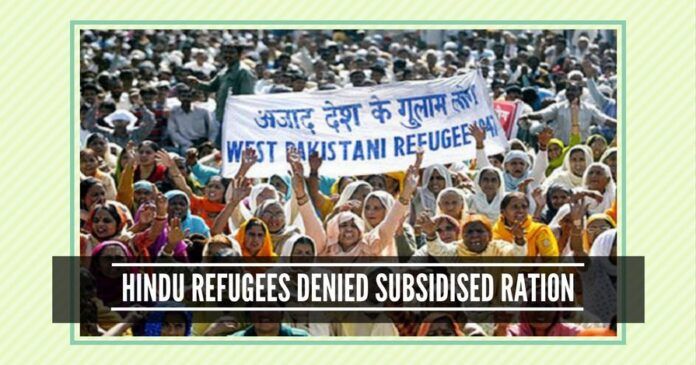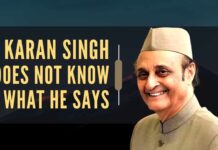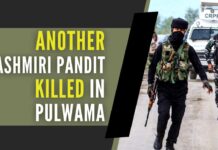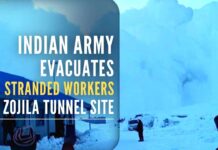
The case in point is the reported deletion of names of nearly 60 refugee families from the ration card beneficiaries’ list
It is just inhuman; it’s an unpardonable sin committed against God and man. How could the BJP-PDP Government in Jammu and Kashmir delete names of Pakistan refugees from the list of beneficiaries getting subsidised ration under the National Food Safety Act (NFSA) and deny them the meagre facility they had been enjoying since decades?
The case in point is the reported deletion of names of nearly 60 refugee families living in Uttam Colony on the outskirts of Jammu city from the ration card beneficiaries’ list issued by the Consumer Affairs and Public Distribution (CAPD) Department.
“We have been told bluntly by the authorities that from this month our names have been deleted from beneficiaries’ lists as refugee families do not have Permanent Resident Certificates (PRCs),” said visibly upset Tara Chand, a West Pakistan refugee. “Without any notice, we were asked to submit our ration cards to get them updated. Now we have been asked to produce Permanent Resident Certificates (PRCs) to be included in the list,” he further reportedly said, adding that ‘for the last 25 years refugees living in this colony have been getting subsidised ration”.
“It appeared that the government wanted to ‘starve’ them as they had been demanding constitutional rights”.
Reacting to the mind-boggling decision of the Jammu and Kashmir Government, president of the West Pakistan Refugee Action Committee (WPRAC), Labha Ram Gandhi, on November 17 said: “It appeared that the government wanted to ‘starve’ them as they had been demanding constitutional rights”. He warned that the suffering and aggrieved “refugees would come on the streets against the decision”.
Gandhi also made a revelation that “just two days ago Minister of State (MoS) in the Prime Minister’s Office (PMO) Jitendra Singh had given the assurance that all rights would be provided to the West Pakistan refugees, but the coalition government, with the BJP as an equal partner, was treating West Pakistan refugees as ‘Bangladeshi or Rohingya’ refugees”. He claimed that “he had received information from other parts of the (Jammu) region as well that refugees were being asked to produce PRCs for getting subsidised ration”.
The worst part of the whole deplorable episode has been that Director, CAPD, Rashid Ahmed Inqlabi and, nor Deputy Commissioner, Jammu, Rajiv Ranjan, have refused to take the responsibility for what is being done to starve the refugees. Inqlabi is claiming that it was Rajiv Ranjan who was chairman of the committee empowered to include or exclude beneficiaries under the NFSA scheme and, hence, he is responsible. Ranjan, on the other hand, is claiming that the “lists were prepared in 2015 before he assumed charge” and, hence, the government is responsible, not he (Tribune, Nov 17).
As for the under-attack BJP for its dubious role, it has described the denial of subsidised ration to West Pakistan refugees as an “administrative faux pas”.
Instead of making its own government to undo the wrong, the BJP asked the already suffering refugees to knock the doors of the Deputy Commissioner
“We assure the West Pakistan refugees that it was an administrative lapse and they will not be denied subsidised ration. The issue of providing subsidised ration to West Pakistan refugees by the CAPD department has already been raised in a Cabinet meeting,” Narinder Singh, BJP state general secretary, said in a statement on November 18.
“The affected families are requested to approach the Deputy Commissioner, Jammu, for re-inclusion of their names in the ration card lists. They are advised to contact the Party’s Grievances Cell in case of any difficulty,” his statement further said (Tribune, Nov 18).
What an irony! Instead of making its own government to undo the wrong, the BJP asked the already suffering refugees to knock the doors of the Deputy Commissioner to get their names included in the list of beneficiaries getting subsidised ration under the NFSA.
It is the same BJP which in November 2014 had held out a categorical and solemn commitment in writing that it, if voted to power, will “grant citizenship rights, including the right to vote in Assembly and local bodies’ elections, right to immovable property, right to higher and technical education, right to state government jobs to refugees from West Pakistan” (Hamare Sapanon Ka Jammu Kashmir: A Vision Document For The Planned Development Of The State, p.5, Nov 2014).
Nearly two-lakh Hindu refugees from the erstwhile West Pakistan (now Pakistan as East Pakistan seceded from Pakistan in 1971 and became the independent Islamic Republic of Bangladesh) based in Jammu had been fighting for citizenship rights since 1947.
The apex court failed them, saying though their demands are genuine & legitimate, it had to interpret the law as it was.
Thousands of Hindu families, mostly belonging to the depressed sections of society, had migrated to Jammu from the adjoining newly-created Pakistan’s Sialkot area to save their honour, dignity and religion and escape their physical liquidation at the hands of the protagonists of the pernicious two-nation theory.
Ever since then, they had been meeting at regular intervals the powers-that-be in Delhi and Jammu and Kashmir, holding protest demonstrations, sitting on dharnas and taking out long marches for obtaining citizenship rights. In between, they had also approached the Supreme Court as well, but much to their chagrin, the apex court also failed them, saying though it considered their demands genuine and legitimate, yet it had to interpret the law as it was and that the law was against them.
Disposing of the Writ Petition (Civil) No. 7698 of 1982 on February 20, 1987, the Supreme Court said it was “unable to give any relief to the petitioner”.
The operative part of the judgement reads:
“In view of the peculiar constitutional position obtaining in the State of Jammu and Kashmir, we do not see what possible relief we can give to the petitioner and those situated like him. All that we can say is that the position of the petitioner (Bachan Lal) and those like him is anomalous and it is up to the legislature of the State of Jammu and Kashmir to take action to amend legislations such as the Jammu and Kashmir Representative of the People Act, 1957, the Land Alienation Act, the Village Panchayat Act, etc so as to make persons like the petitioner who have migrated from West Pakistan in 1947 and who have settled down in the State of Jammu and Kashmir since then, eligible to be included in the electoral roll, to acquire land, to be elected to the panchayats, etc etc. This can be done by suitably amending the legislations without having to amend the Jammu and Kashmir Constitution”.
The operative part further reads:
“The petitioners have a justifiable grievance. Surely they are entitled to expect to be protected by the State of Jammu and Kashmir. In the peculiar context of the State of Jammu and Kashmir, the Union of India also owes an obligation to make some provisions for the advancement of the cultural, economic and educational rights of these persons. We do hope that the claims of the persons like the petitioner (Bachan Lal) and others to exercise greater rights of citizenship will receive due consideration from the Union of India and the State of Jammu and Kashmir. We are, however, unable to give any relief to the petitioner”.
Sadly, however, neither the Union Government nor the Jammu and Kashmir Government thought it politically prudent to give an effect to its suggestions. The Kashmiri Muslim ruling elite opposed their demand seeking citizenship rights on the grounds that its acceptance would, on the one hand, alter the demographic profile of the State and, on the other, dilute the autonomous character Jammu and Kashmir enjoyed under Article 370 of the Indian Constitution and all the successive governments at the Centre went by the Kashmiri Muslim view overlooking the Preamble and Articles 14 and 21 of the Indian Constitution which gives equal rights to all Indian citizens across the nation.
Had these Hindu families entered J & K on or before May 14, 1954, they would have become full-fledged citizens
It needs to be underlined that “temporary” Article 370 and Article 35-A, which was inserted in Appendix II of the Indian Constitution in a hush-hush manner without taking the Parliament on board or without invoking Article 368, in 1954, were the two main stumbling blocks. It is ironical that the Supreme Court considered Articles 370 and 35-A infallible, and not the Preamble and Articles 370 and 35-A as non-negotiable.
Had these Hindu families entered Jammu and Kashmir on or before May 14, 1954, they would have become full-fledged citizens of the state and their socio-political status would have been at par with those called “Permanent Residents” of the State.
Article 370 gives a special status to Jammu and Kashmir on the score of religion and no Central law can be applied to it without the concurrence of the Jammu and Kashmir Government. It has, in fact, created a Muslim republic on the territories of India. Article 35-A empowers the Jammu and Kashmir Government to grant or not to grant citizenship rights to a person or a group of persons who were not the residents of the State prior to May 14, 1954. This Article was applied retrospectively only to keep the Kashmiri Muslim leadership happy and fulfil their insatiable lust for a non-Indian regime. So obnoxious was Article 35-A that it barred even President of India, the First Citizen of the nation, from acquiring even an inch of land in Jammu and Kashmir.
Will Prime Minister Narendra Modi take note of the wrong committed by the BJP-PDP Government in Jammu and Kashmir and order it to not deny food to these hapless refugees? Will he also grant them citizenship rights as promised? He must fulfil the promises the BJP made to garner the Hindu refugee votes in the 2014 Lok Sabha elections. Indeed, these refugees deserve a special treatment as they are the only social group in the whole country who have no citizenship rights in the country despite their 70-year-long stay in Jammu, the integral part of India.
Note:
1. The views expressed here are those of the author and do not necessarily represent or reflect the views of PGurus.
- ‘Kashmir My core constituency’: Revisiting July 12, 2003 to understand politics, Omar Abdullah-style - March 15, 2024
- Total deviation from traditional approach: Seven takeaways from PM Modi’s March 7 Srinagar visit - March 9, 2024
- Status of political parties: Why is further J&K reorganization imperative? - March 1, 2024











Refusing FOOD to anybody is inhuman & the perpetrators are devils.
–
They are not rohingyas from Myanmar.
Kaffirs are not Humans!